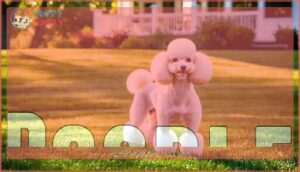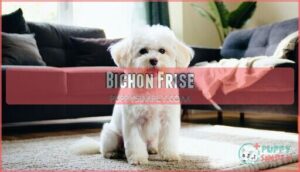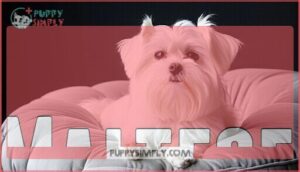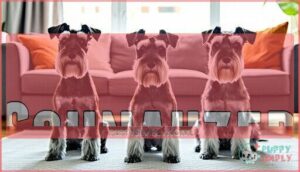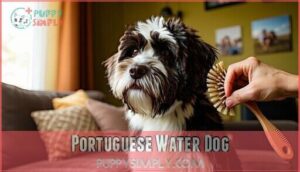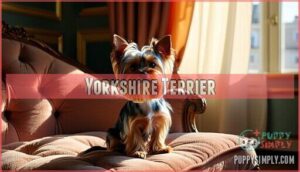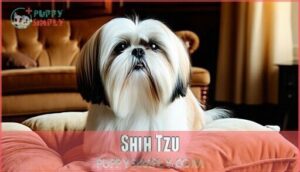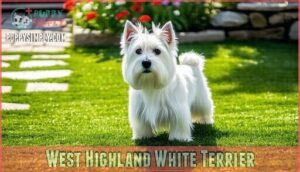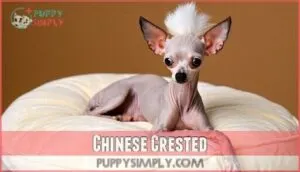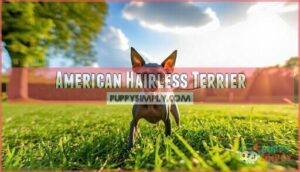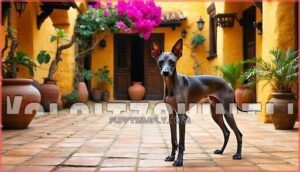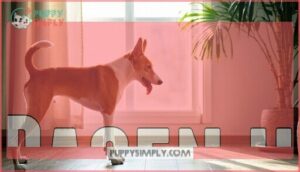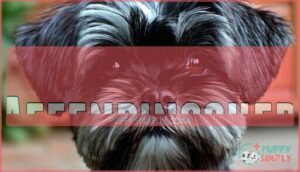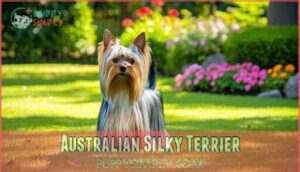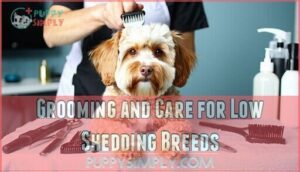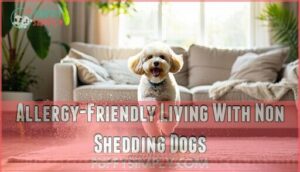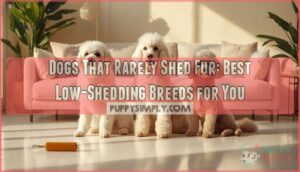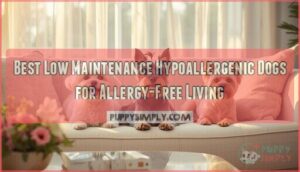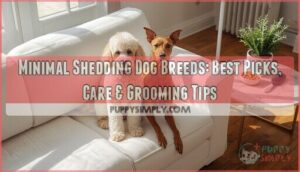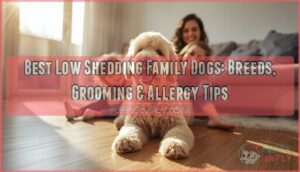This site is supported by our readers. We may earn a commission, at no cost to you, if you purchase through links.
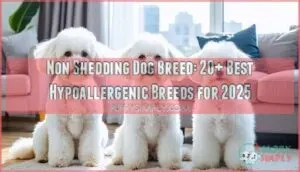
Breeds like Poodles, Bichon Frises, and Maltese produce way less dander too, which means fewer allergy flare-ups for sensitive family members. You’ll need to invest in professional grooming every month or so to keep their coats from turning into matted messes, but that’s a small price to pay for a virtually hair-free home.
The secret to choosing the right breed goes beyond just the shedding factor.
Table Of Contents
- Key Takeaways
- Best Non Shedding Dog Breeds
- Unique Hypoallergenic Dog Breeds
- Small Non Shedding Dogs for Apartments
- Grooming and Care for Low Shedding Breeds
- Allergy-Friendly Living With Non Shedding Dogs
- Frequently Asked Questions (FAQs)
- Are there any rescues or shelters that specialize in non shedding breeds?
- Do non-shedding dogs cost more than regular breeds?
- Can non-shedding dogs live in cold climates?
- How often should hypoallergenic dogs see veterinarians?
- Are non-shedding breeds good with small children?
- What health problems affect low-shedding dogs most?
- Conclusion
Key Takeaways
- You’ll dramatically reduce home allergens with breeds like Poodles, Bichon Frises, and Maltese, since their curly coats trap loose hair instead of scattering it throughout your living space.
- You’ll need to budget for professional grooming every 4-8 weeks to prevent matting and maintain your dog’s hypoallergenic qualities, making this an ongoing investment in cleaner living.
- You can find apartment-friendly options in smaller non-shedding breeds like Toy Poodles, Coton de Tulears, and Yorkshire Terriers that adapt well to limited space while keeping allergens low.
- You’ll still need daily brushing and proper skin care, since even non-shedding dogs produce dander, and consistent grooming reduces allergen buildup by up to 84%.
Best Non Shedding Dog Breeds
You’ll find that choosing a non-shedding dog breed can transform your home from a fur-covered chaos zone into a cleaner, more comfortable living space. These hypoallergenic champions produce substantially less dander and shed minimal hair, making them perfect companions for allergy sufferers and anyone who’d rather spend time playing fetch than constantly vacuuming.
Poodle
Poodles are the pinnacle for NonShedding, Hypoallergenic Dog Breeds. Their curly coat traps loose hair instead of releasing it everywhere. You’ll find Poodle intelligence makes Poodle training a breeze, while their adaptable nature suits any lifestyle.
Poodles: where genius meets gorgeous in a perfectly packaged, non-shedding companion
Regular Poodle grooming every 6-8 weeks keeps their coat healthy. Poodles are still prone to common allergy triggers, so monitoring their environment is important.
With excellent Poodle health and stunning Poodle colors available, these loyal companions truly deliver on their hypoallergenic promise.
Bichon Frise
Why choose a Bichon Frise when you want a cheerful companion that won’t leave hair everywhere? This fluffy white bundle of joy combines a playful temperament with genuinely hypoallergenic qualities, making them perfect low-shedding dogs for families.
- Non-Shedding Coat: Double-layered curly fur traps loose hair instead of releasing it
- Grooming Needs: Professional grooming every 4-6 weeks prevents matting and maintains health
- Training Tips: Positive reinforcement works best with their keen-to-please personality
- Bichon Health: Generally sturdy but watch for hip dysplasia and eye conditions
Maltese
The Maltese brings elegance in a tiny package. These silk-coated companions weigh just 4-7 pounds but pack enormous personality.
Their hypoallergenic white coat requires daily brushing to prevent matting, making grooming needs quite demanding.
Despite their delicate appearance, Maltese dogs show surprising confidence and can be stubborn during training. Originally bred as Mediterranean companions, they’re perfect apartment dogs but need consistent socialization to avoid becoming overly protective of their families.
Schnauzer
These intelligent, loyal companions come in three distinct sizes to fit any lifestyle. Schnauzers boast wiry, low-shedding coats that make them excellent hypoallergenic dog breeds for allergy sufferers.
Key Schnauzer characteristics:
- Schnauzer Size: Miniature Schnauzer (12-20 lbs), Standard Schnauzer (30-50 lbs), Giant Schnauzer (55-85 lbs)
- Schnauzer Temperament: Alert, spirited, and incredibly devoted to their families
- Schnauzer Training: Highly intelligent breed that responds well to consistent, positive reinforcement
- Schnauzer Grooming: Regular brushing prevents matting; professional trimming every 6-8 weeks maintains coat health
Portuguese Water Dog
Portuguese Water Dogs burst onto the family scene as energetic companions who thrive on activity and adventure. These hypoallergenic dogs sport curly, low-shedding coats that require regular professional grooming to prevent matting.
Originally bred for water work, they need extensive exercise and excel with water dog training. While generally healthy, Portuguese Water Dogs can face health issues like hip dysplasia and eye conditions, making veterinary care essential for these intelligent, loyal family pets.
Yorkshire Terrier
Yorkshire Terriers pack big personality into their 4-7 pound frames. These spunky hypoallergenic dogs shed minimally thanks to their silky, human-like hair texture.
Yorkie temperament combines fearless confidence with affection, though training challenges arise from their stubborn streak. With proper socialization, they’re apartment-friendly companions.
Yorkie health concerns include luxating patella and tracheal collapse, but their 12-15 year lifespan rewards dedicated owners with years of loyal friendship.
Shih Tzu
These adorable "lion dogs" sport flowing double coats that trap loose hair, making them excellent Low Shedding Dogs for Dog Allergies sufferers. Their coats, however, require regular maintenance.
Shih Tzu Temperament is remarkably friendly and adaptable. Training Tips include positive reinforcement, as they’re keen to please despite occasional stubbornness.
With roots in Shih Tzu History dating back to Chinese royalty, these NonShedding Coats demand professional grooming every 6-8 weeks. Their Grooming Needs require daily brushing to prevent matting.
West Highland White Terrier
While West Highland White Terriers aren’t completely hypoallergenic, their double coat traps loose hair effectively, making them suitable for mild allergy sufferers. Regular grooming every 4-6 weeks helps manage shedding and reduces dander.
What makes Westies special:
- Their harsh outer coat minimizes visible hair around your home
- Moderate allergen levels work for less severe dog allergies
- Compact size perfect for apartment living without messy fur
- Friendly Westie temperament bonds beautifully with families
This Scottish Terrier breed requires consistent brushing and professional grooming specifics to prevent matting while maintaining their characteristic white coat.
Unique Hypoallergenic Dog Breeds
If you’re looking beyond the usual suspects, these unique hypoallergenic breeds offer something special for allergy-sensitive families. From ancient hairless dogs to fearless little companions, these breeds prove that low-shedding doesn’t mean low personality.
Chinese Crested
Chinese Crested dogs come in two stunning varieties that’ll make your allergies disappear. The Hairless Variety produces minimal dander thanks to its exposed skin, while the Powderpuff Coat requires regular brushing but sheds very little. Both varieties need special attention to their unique grooming needs and potential health concerns, though their loyal temperament traits make them perfect companions. They’re believed to descend from African hairless dog breeds.
| Feature | Hairless Variety | Powderpuff Variety |
|---|---|---|
| Shedding Level | Minimal to none | Very low |
| Grooming Frequency | Weekly bathing | Daily brushing |
| Allergen Production | Lowest dander | Low dander |
| Skin Care Needs | Sunscreen required | Standard coat care |
American Hairless Terrier
The American Hairless Terrier brings something special to hypoallergenic dog breeds – it’s actually hairless! This Louisiana-born terrier descends from Rat Terriers, creating an energetic, intelligent companion perfect for dog allergy sufferers.
Their smooth skin requires sunscreen and weekly baths, but you’ll love their playful AHT temperament and zero shedding worries in apartments.
Xoloitzcuintli
Mexico’s ancient Xoloitzcuintli boasts over 3,000 years of history as a loyal companion. These hairless variations make excellent hypoallergenic dog breeds for allergies since they shed minimally.
Their calm temperament traits suit families perfectly, though training needs consistent guidance.
Regular skin care prevents dander buildup, making this nonshedding breed ideal for allergy-sensitive households seeking a unique, devoted friend.
Basenji
Originally bred for hunting in the Congo, this barkless dog brings unique traits that make it surprisingly allergy-friendly. The Basenji’s cat-like grooming habits and minimal shedding create fewer airborne allergens, though training challenges arise from their independent nature.
- Minimal shedding: Sheds mainly once yearly during spring season
- Self-grooming behavior: Cat-like cleaning reduces saliva and dander on fur
- Low odor production: Naturally clean with limited doggy smell
- Hunting instincts: Strong prey drive requires consistent training approach
- Grooming needs: Requires minimal maintenance due to short, fine coat
Affenpinscher
Little "monkey terriers" pack surprising hypoallergenic benefits into their compact frames. Affenpinschers sport wiry, dense coats that trap dander rather than releasing it airborne, making them excellent non-shedding dogs for sensitive households. Their dry-mouthed trait reduces salivary allergens, while small size limits outdoor allergen spread. Regular brushing maintains their hypoallergenic qualities perfectly.
These breeds are known for lower dander production, which helps reduce allergic reactions.
Australian Silky Terrier
You’ll love the Australian Silky Terrier’s elegant coat that sheds minimally, making them perfect hypoallergenic dog breeds for allergy solutions. Their silky temperament pairs with moderate exercise needs and straightforward grooming specifics.
While terrier breeds can face common ailments like luxating patella, their breed history shows notable adaptability. Regular brushing prevents matting in their single-layer coat.
Small Non Shedding Dogs for Apartments
Living in a cramped apartment doesn’t mean you can’t enjoy the company of a furry friend who won’t leave hair tumbleweeds under your couch.
These compact, low-shedding breeds adapt beautifully to smaller spaces while keeping your vacuum cleaner from working overtime.
Coton De Tulear
You’ll find the Coton de Tulear fits perfectly into apartment living with their 8-13 pound frame. These nonshedding dog breeds shine with hypoallergenic coats requiring weekly grooming.
Their moderate activity levels suit small spaces, though Coton temperament demands regular interaction to prevent separation anxiety. Training needs remain manageable for most owners seeking small dog breeds.
Lhasa Apso
These regal dogs sport flowing double coats with coat characteristics that shed minimally, making them perfect apartment companions. Weighing 12-18 pounds, Lhasa Apsos demonstrate notable temperament traits, including independence and alertness. Their breed history traces back to Tibetan monasteries, where they served as sentinel dogs.
While training needs require patience due to their strong-willed nature, they’re surprisingly tolerant of alone time. Daily dog grooming prevents matting, and potential health concerns include eye issues requiring regular vet checkups. They’re also known to be loyal and affectionate companions.
Cairn Terrier
Beyond their scruffy charm and compact frame, Cairn Terriers make apartment living a breeze with their wiry double coat that barely sheds. These independent pups adapt quickly to smaller spaces while keeping allergens at bay.
- Cairn Temperament: Friendly yet independent nature suits varied living situations
- Terrier Grooming: Regular brushing maintains their low-shedding coat without fuss
- Cairn Health: Sturdy build manages indoor activity and moderate exercise needs
- Cairn Training: Smart and keen learners respond well to consistent apartment rules
Scottish Terrier
Scottish Terriers pack personality into their 18-22 pound frames, making apartment living totally doable. Their Terrier Temperament shines through independence and confidence—they won’t drive neighbors crazy with constant barking.
This lowshedding Dog Breeds member needs daily walks but adapts well to smaller spaces.
Scottish Health stays solid with proper care, while Grooming Needs remain manageable with periodic trimming.
Toy Poodle
Compact Toy Poodle Size makes them perfect apartment companions, usually weighing 4-6 pounds with minimal shedding. These Hypoallergenic Dog Breeds offer excellent Dog Allergy Solutions through their Lowshedding coats. Their intelligence means Training Needs are manageable, though Puppy Prices can be steep. Common Health issues include luxating patella, but their loyal Temperament Traits make them worth it.
- Perfect apartment size: 4-6 pounds with minimal space requirements
- Hypoallergenic coat: Curly fur traps dander, reducing allergens substantially
- Smart and trainable: High intelligence makes housebreaking easier in small spaces
- Low maintenance shedding: Daily brushing prevents mats without constant cleanup
Grooming and Care for Low Shedding Breeds
You’ll need to stay on top of grooming for your low-shedding dog since their unique coats require different care than typical breeds.
Regular brushing and professional maintenance keep these special coats healthy and prevent the matting that can turn your fluffy friend into a walking tumbleweed.
Coat Maintenance and Mat Prevention
Daily brushing cuts matting risk by 85% in breeds like Poodles and Bichon Frises. You’ll need proper coat brushing techniques and mat prevention products for success. Professional grooming every 4-6 weeks keeps coats healthy, while DIY grooming tips help between visits.
Focus on high-friction areas behind ears and under legs where mats form first. Consistent care means fewer vet visits for skin issues. Many owners find success with specialized grooming products.
Skin and Ear Care
Your hypoallergenic dog’s skin and ears need special attention since these breeds face unique challenges. Ear infections strike 45% more often in dogs with floppy ears due to poor airflow. Weekly cleaning with proper solutions cuts infection rates by 70%.
Watch for skin allergies and breed predispositions—some dogs develop sensitivities requiring pH-balanced, unscented products. Many owners find relief using gentle dog washes. Regular preventative measures keep your pup healthy and comfortable.
Regular Trimming and Bathing
Every three to six weeks, your non shedding dogs need professional grooming to maintain healthy coat growth and prevent matting. Monthly bathing keeps oils balanced without overdrying skin—active dog breeds may need more frequent washes.
Regular Trimming Techniques reduce tangles by 70%, making DIY grooming easier. Using the correct grooming clippers can greatly improve grooming results.
Smart Bathing Frequency prevents dander buildup while supporting your pet grooming routine perfectly.
Essential Grooming Tools
Five essential grooming tools can transform your non-shedding dogs from scraggly to magnificent. Quality brush types and comb selection make all the difference for pet grooming success with dog breeds like Poodles and Maltese.
- Slicker brushes – Remove loose hair and prevent matting in curly coats
- Pin brushes with metal combs – Perfect for detangling longer-haired breeds safely
- Hypoallergenic shampoos – Minimize skin irritation during regular baths
- Nail clippers or grinders – Maintain healthy paws with monthly trimming
- Low-heat dryers – Essential drying techniques that protect delicate coats
Remember: clipper maintenance keeps tools sharp, while proper shampoo choices and dog grooming tips guarantee your furry friend stays comfortable throughout the process. Regular ear cleaning using ear cleansing solutions is also important for hygiene.
Allergy-Friendly Living With Non Shedding Dogs
You’ll love how non-shedding dogs can transform your home into an allergy-friendly haven with just a few smart adjustments.
These breeds won’t eliminate all allergens, but they’ll dramatically reduce the sneezing fits and watery eyes that make dog ownership feel impossible for sensitive families.
Managing Pet Dander
Regular grooming addresses pet dander head-on, with weekly bathing removing up to 84% of built-up allergens from your hypoallergenic dog’s coat. You’ll notice improved home air quality when combining proper bathing frequency with breed-specific dander reduction techniques.
Even non-shedding dogs produce dander, so consistent allergen control through pet allergy management keeps your allergies in check. Air purifiers can also help to manage environmental dog allergens.
Reducing Allergens at Home
Beyond choosing non-shedding dogs, creating an allergen-free home requires strategic modifications. HEPA filter air purifiers remove 99.97% of airborne dander, while allergen-resistant mattress covers create protective barriers. Frequent vacuuming with specialized filters and washing fabrics in hot water effectively reduces accumulated allergens.
- Air purifiers working around the clock – like having a silent guardian protecting your family’s breathing space
- Allergen barriers on bedding – turning your bedroom into a peaceful sanctuary where restful sleep comes naturally
- Regular cleaning routines – transforming daily chores into powerful weapons against pet allergies
Tips for Families and Apartment Living
Successfully integrating hypoallergenic breeds into your home starts with choosing dogs that match your Family Compatibility needs. Low shedding breeds like Bichon Frises excel as Family Pets because their calm Breed Temperament accommodates children well.
For Apartment Dogs, focus on Noise Levels—Poodles and Maltese adapt beautifully to close quarters. Their Training Needs remain manageable with consistent Apartment Exercise routines using hallway games and puzzle toys.
Frequently Asked Questions (FAQs)
Are there any rescues or shelters that specialize in non shedding breeds?
Like finding a needle in a haystack, you’ll discover specialized rescues focus on low-shedding breeds. Some rescues maintain hypoallergenic directories , while others work with breed-specific organizations to help allergy-sensitive families find their perfect match.
Do non-shedding dogs cost more than regular breeds?
Yes, non-shedding breeds usually cost more upfront and long-term. You’ll pay premium prices for purebred poodles or Portuguese water dogs, plus they need professional grooming every 6-8 weeks, making them pricier pets overall.
Can non-shedding dogs live in cold climates?
Non-shedding dogs can handle cold climates, but you’ll need to provide extra protection. Their coats don’t insulate as well as traditional breeds, so consider sweaters, booties, and limiting outdoor time during harsh weather conditions.
How often should hypoallergenic dogs see veterinarians?
You should schedule veterinary check-ups for your hypoallergenic pup every six to twelve months, just like any other dog. Regular visits help catch health issues early and keep your furry friend happy and healthy.
Are non-shedding breeds good with small children?
They’re wonderful companions for little ones. Many non-shedding breeds like Bichon Frises and Poodles are naturally gentle, patient, and playful—perfect for children who need loyal furry friends without the sneezing.
What health problems affect low-shedding dogs most?
Low-shedding dogs frequently develop skin problems like acne and blackheads due to their coat type. They’re also prone to eye issues, autoimmune disorders, and need regular grooming to prevent matting-related skin irritation.
Conclusion
Finding your perfect non shedding dog breed is like discovering a treasure map – it leads you to countless rewards without the messy journey. These hypoallergenic companions offer the joy of pet ownership minus the constant vacuuming marathon.
Whether you choose a playful Poodle or gentle Maltese, you’re investing in cleaner air, fewer allergies, and more quality time with your furry friend.
Remember, regular grooming keeps their coats healthy and your home spotless. You’ve got the knowledge – now find your ideal match.

